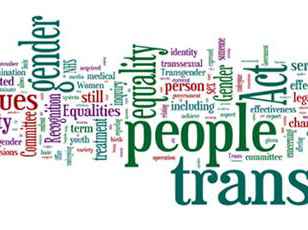The ERA: A Beacon of Hope for Transgender Healthcare

In the intricate terrain of transgender healthcare access, the journey towards gender-affirming care is fraught with challenges. In a landmark settlement on August 23, 2023, Makyyla Holland, a 25-year-old Black transgender woman, achieved a significant victory against Broome County following a harrowing ordeal at the Broome County Jail in 2021. Ms. Holland, represented by the Transgender Legal Defense & Education Fund (TLDEF), the New York Civil Liberties Union (NYCLU), and pro bono counsel Paul, Weiss, Rifkind, Wharton & Garrison LLP, filed a lawsuit in 2022 against the county for the egregious violence, denial of medical care, and discrimination she endured due to her transgender identity. The case exposed instances of discrimination based on sex, transgender status, anrad disability, including physical abuse, illegal strip searches, improper housing, and denial of essential medications, underscoring the urgency of systemic change to protect the rights and well-being of transgender individuals in custody.
Holland’s case reflects levels of discrimination faced by incarcerated transgender people, but in the complex landscape of healthcare access for transgender individuals, significant challenges persist, impeding the path to gender-affirming care. In a 2021 study conducted by the liberal think tank, the Center for American Progress (CAP), it was revealed that almost 50% of transgender individuals, and 68% of transgender individuals belonging to ethnic minorities, disclosed instances of mistreatment from medical providers within one year of the preceding the 2020 survey. This mistreatment encompassed refusal of care, as well as verbal and physical abuse.
The survey further identified that such discrimination had a lasting impact on healthcare-seeking behavior, with 28% of transgender individuals, including 22% of those from ethnic minorities, acknowledging that they had either postponed or completely foregone necessary medical care due to the apprehension of facing discrimination. Recent events have attested to an alarming surge in attacks on transgender and gender-affirming health care at the state level. Amidst these challenges, this recent landmark settlement in Broome County, New York, stands as a beacon of legal advocacy for transgender rights, shedding light on the critical need for comprehensive legal support in safeguarding the healthcare rights of the transgender community.
While victories such as the Broome County settlement mark progress, legal challenges persist. Discrimination, healthcare disparities, and civil rights violations highlight the pressing need for comprehensive legal support to ensure widespread access to gender-affirming care. Maeve DuVally’s personal journey echoes this struggle, offering a firsthand account of the challenges faced by transgender individuals. DuVally, a longtime Goldman Sachs executive, transitioned to a woman after coming out in 2018. Living in New York, she shares positive experiences in supportive environments but acknowledges the broader challenges faced by the transgender community nationwide. “I live in New York and frequently visit Provincetown in Massachusetts, a gay enclave, and Los Angeles. I prefer staying in West Hollywood, a queer area, where transgender people are generally treated equally, which makes me feel good. Despite this, I occasionally feel guilty about not being in places where transgender individuals face inequality and expressed a desire to do more for the community.” She has written about her journey extensively in her memoir, Maeve Rising: Coming Out Trans in Corporate America. DuVally emphasizes, “I think that every transgender person should have access to the same care, regardless of where they are.”
The Equal Rights Amendment
Nicole Vorrasi Bates, Founder and Executive Director of Shattering Glass, emphasizes the legal significance of the Equal Rights Amendment (ERA), which provides a crucial tool to counteract attacks on the rights of the LGBTQ+ community, including ongoing legal battles in states like Tennessee and Kentucky regarding gender-affirming care bans. The ERA, if enacted, could elevate these cases to a higher level of scrutiny, significantly impacting the chances of success. “With the Equal Rights Amendment, you get strict scrutiny, and that’s a big difference. It goes from a 20% chance of winning and defeating the bans to a 73% chance of winning,” Bates says.
But Bates doesn’t view the ERA solely through a legal lens. For her, it’s not just a legal instrument but a powerful message to society. “I think the most important thing for me about getting the Equal Rights Amendment into the Constitution…we’re sending a message that everyone is equal. We will not tolerate these actions, these laws that treat people like they’re less than a complete person,” she adds.
Amidst these challenges, the Equal Rights Amendment (ERA) emerges as a potential beacon of hope. With its historical significance and potential federal impact, the ERA could play a crucial role in addressing threats to gender-affirming care. Ongoing efforts to include transgender rights under the ERA signal a pivotal step towards securing equal rights for all. DuVally’s story adds a personal dimension, emphasizing the urgency of legal protections to ensure equitable access to healthcare for transgender individuals across the nation. “Access to gender-affirming care is not a luxury; it’s a necessity,” DuVally continues.
The battle for transgender rights is not merely a legal struggle but a societal debate reflected in the perspectives of organizations and advocates. Supporters emphasize gender-affirming care as a fundamental right, while opponents seek restrictive measures. Legal and policy developments play a pivotal role in shaping the narrative and protecting transgender individuals’ rights. DuVally’s advice is to prioritize access to mental health care alongside community support, highlighting the complex nature of the coming-out process. However, she acknowledges the disparities in healthcare access across different regions of the country. “The mental health aspect is often overlooked, but it’s a crucial part of the journey. Support should be holistic,” she stresses.
The potential impact of the ERA and continued legal and policy advocacy remains crucial in forging a path towards a future where transgender individuals can access gender-affirming care without discrimination or barriers. The fight for transgender rights is not just a legal battle; it is a call to recognize and respect the inherent dignity and rights of every individual, regardless of their gender identity. DuVally’s personal journey, with its triumphs and challenges, reflects the broader struggle for equality and acceptance within the transgender community, underscoring the need for legal protections and societal understanding. “Our journey is not just about ourselves; it’s about creating a more inclusive and accepting world for everyone,” she concludes.
About the author: Sheetal Banchariya is a fellow in the Sy Syms Journalistic Excellence Program* at Women’s eNews, funded by the Sy Syms Foundation. The Sy Syms Journalistic Excellence Program at Women’s eNews fellowship supports editorial and development opportunities for editorial interns in the pursuit of journalistic excellence.
*The Sy Syms Journalistic Excellence Program:
The Sy Syms Journalistic Excellence program at Women’s eNews was launched in 2014 with support from the Sy Syms Foundation. The fellowship provides support and development opportunities for editorial interns in the pursuit of journalistic excellence.
“For a democracy to flourish all voices must be heard.” says Marcy Syms, a founding Trustee and President of the Sy Syms Foundation. “Through its investigative reporting Women’s eNews gets at the essence of good journalism. The Sy Syms Foundation is proud of this collaboration to support today’s newest women journalists.”
As part of its mission to create social change for women and girls through investigative reporting, Women’s eNews helps foster, train, and support the career development of new journalists with a focus on social justice and women’s rights.





